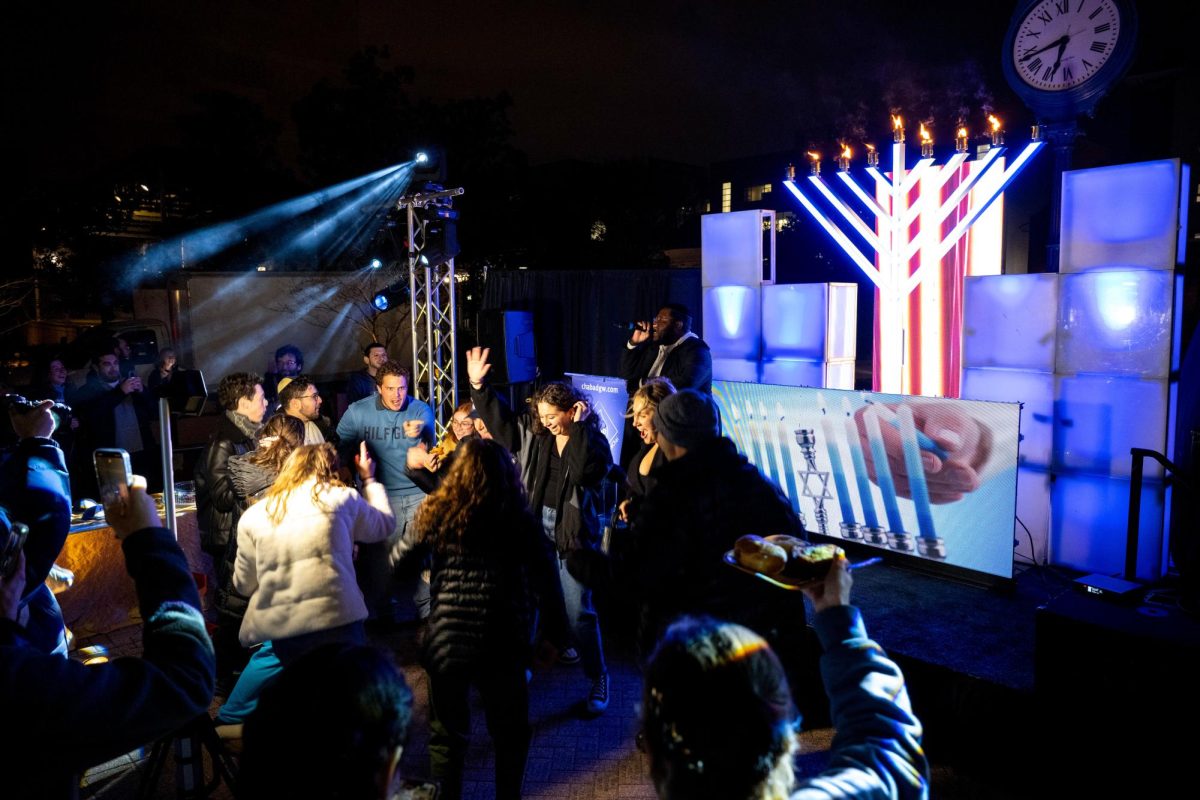Neon-blue light from a giant LED menorah in Kogan Plaza silhouetted students as they gathered to watch a live hip-hop rendition of the Jewish song “Hava Nagila,” listen to speeches and scarf down hot latkes and powdered sufganiyot Tuesday night in anticipation of the beginning of Hanukkah.
Chabad GW — a Jewish organization for GW community members — hosted the “pre mega Chanukah” two days prior to the beginning of the eight-day holiday Thursday, with food, live music and a menorah lighting ceremony. Student organizers of Chabad GW said they were excited to come together and unify as a community in preparation for the start of Hanukkah, also spelled as Chanukah, a festival of light that celebrates the rededication of the Second Temple of Jerusalem in the second century BCE.
Platters of food, including potato latkes with applesauce, cookies and sufganiyot, or Israeli jelly doughnuts, flanked a small stage in front of Kogan Plaza’s clock tower illuminated by brightly colored lights and the menorah. David Friedland, a junior and member of Chabad GW, took to the stage to kick off the celebration.
“As we light the Hanukkah candles, let us be reminded of the power of light over darkness and the strength that comes from standing united,” Friedland said. “Hanukkah serves as a beacon of hope, symbolizing triumph and perseverance and the ability to overcome obstacles.”
Ari Patinkin, a junior and president of Chabad GW, was joined by freshman Chabad GW representative Aiden Shurr to light all nine of the candles on the menorah. On the first night of Hanukkah on Thursday, observers will light only the candle on the right-most side of the menorah — as well as the candle used to light it, the shamash — and then another candle each night until all nine are lit.
Organizers laid out menorahs in boxes on tables, each with nine candles and a dreidel, for students to take back to their dorms.
“The idea is to take the light from here to your rooms and inspire and warm up others who are in need of the light,” said Rabbi Levi Shemtov, the founder and director of Chabad GW. “It’s light and warm. That’s what Hanukkah is all about.”
Shemtov encouraged attendees to move closer to the stage before the night’s headline performer, Hasidic Jewish rapper Nissim Black, began his show. Black said he is a “spiritual motivator,” rapper and singer who hopes to inspire people through his music, which primarily focuses on Judaism.
“I love to uplift people, bring people to joy, inspire people,” Black said. “When I was in high school, I was a popular kid. I could’ve won a lot of things in the yearbook but I won ‘most inspirational.’ I really run with that, and that’s what I like to do with my music.”
Black’s performance transformed Kogan into a concert-like atmosphere as students danced along to his remix of “Hava Nagila” — a traditional song played at many Jewish celebrations — with new lines like “I’m Black, Jewish and I’m proud” added during instrumental sections to incorporate his own background into the music.
Junior Noah Arazi said he attended the event to celebrate with his Jewish friends and enjoyed seeing the diversity that Black brings to the Jewish community, specifically the Hasidic community.
“It’s quite rare to come across Jews of color and I think it’s great, especially in the Hasidic community, which is the ultra-orthodox community,” Arazi said. “I think it’s great that someone like him is out there representing.”
Junior and Chabad GW programming chair Jordan Maged said there was no hesitation about continuing their annual Hanukkah event and that the celebration allows Jewish students to express themselves and be proud of their religion in light of the war between Israel and Hamas.
“GW is 33 percent Jewish,” Maged said. “People can’t go home for the holidays. We want them to be able to come get a menorah here tonight, be able to light the candles every single night, say the prayers and you know, be able to celebrate something that’s important.”
Patinkin said he wanted to increase the scale of the annual event this year through the incorporation of the large menorah and a live music production and improve morale during “a year of darkness.”
“You can tell there’s tension on campus,” Patinkin said. “We want to show that we can still be around and we are still proud of our religion and we are still proud to be Jews on campus.”





